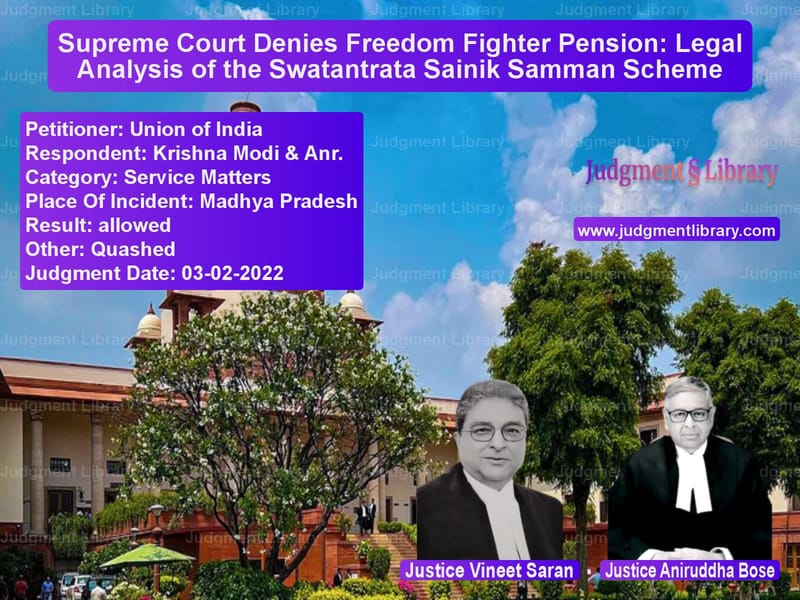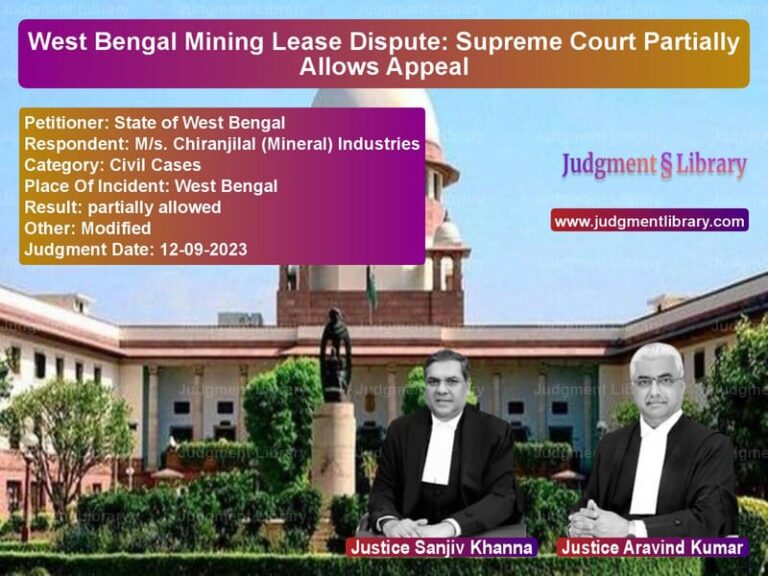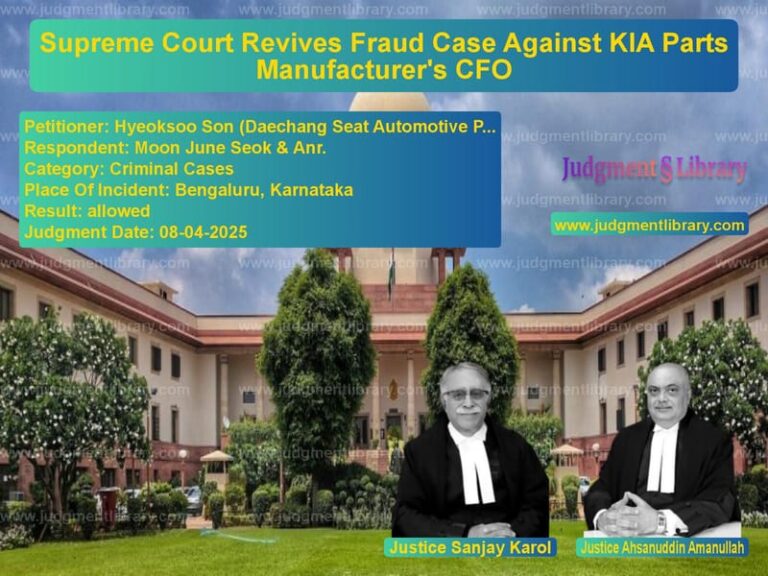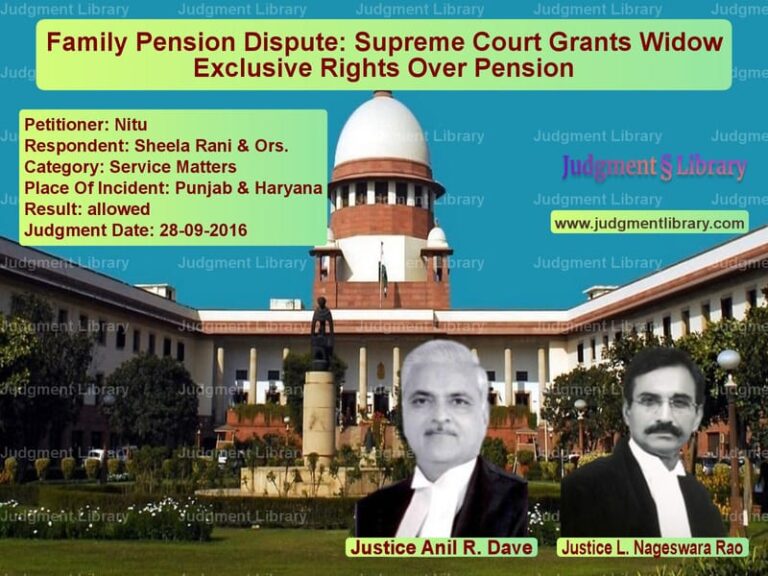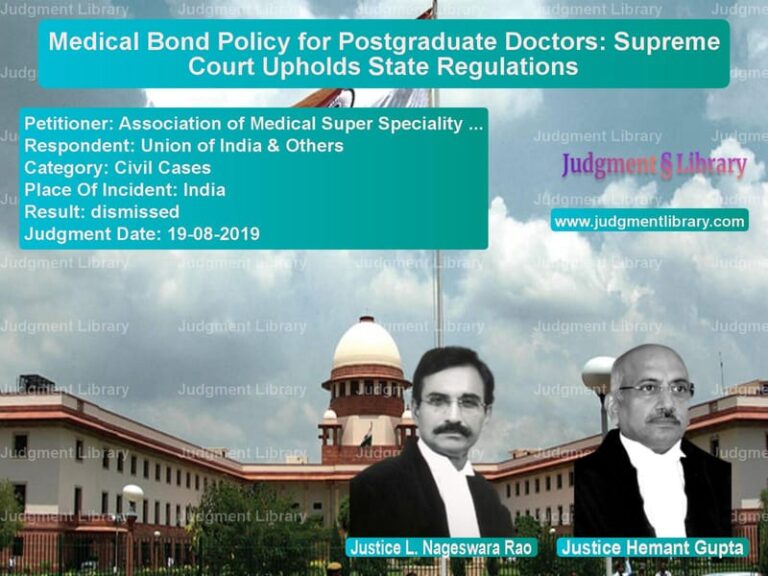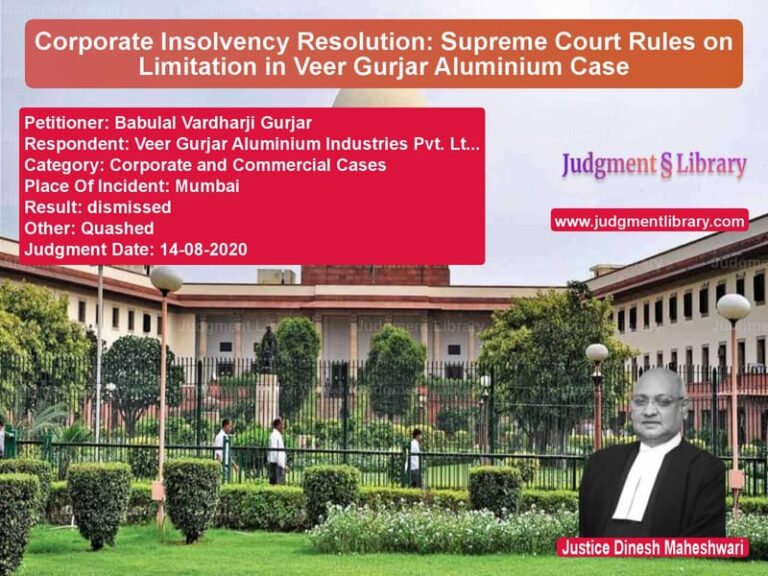Supreme Court Denies Freedom Fighter Pension: Legal Analysis of the Swatantrata Sainik Samman Scheme
The Supreme Court, in Union of India vs. Krishna Modi & Anr., ruled on a significant dispute regarding the grant of pension under the Swatantrata Sainik Samman Pension Scheme (SSS Pension Scheme), 1980. The case revolved around whether an individual could claim the status of a freedom fighter and receive a pension based on unverified claims of being underground during the freedom struggle.
Background of the Case
The case originated when Krishna Modi (Respondent No.1) applied for a pension under the SSS Pension Scheme, 1980, claiming that he had participated in the Quit India Movement of 1942. He asserted that he had remained underground from 21 November 1942 to 20 August 1943, due to fear of arrest, and was, therefore, entitled to the pension.
His initial application, submitted on 27 December 1982, was not processed for several years. After repeated litigation before the Madhya Pradesh High Court, the Central Government finally rejected his application on 3 February 2009. Dissatisfied, he challenged this decision before the Madhya Pradesh High Court, where a Single Judge ruled in his favor on 14 February 2019, directing the government to grant him the pension with 6% interest per annum. The Division Bench upheld this order on 17 February 2020, leading the Union of India to appeal before the Supreme Court.
Arguments by the Parties
Petitioner’s Arguments (Union of India)
- Krishna Modi was born on 5 July 1930 and was merely 12 years old during the alleged underground period, making it implausible that he actively participated in the freedom struggle.
- The only supporting evidence was a school certificate issued after 40 years, stating that he had attended school before and after the alleged underground period.
- Merely not attending school for a period does not prove underground status.
- The SSS Pension Scheme required applicants to either be declared as a proclaimed offender, have an arrest warrant or bounty on their head, or have an unexecuted detention order – none of which applied to Krishna Modi.
- His application was delayed by 20 years, undermining its credibility.
- The scheme required a Non-Availability of Records Certificate (NARC), which he failed to provide.
- The state government merely forwarded his application without recommending him for the pension.
Respondent’s Arguments (Krishna Modi)
- The High Court had already ruled in his favor, confirming that he met the SSS Pension Scheme’s criteria.
- The state government had granted him a similar pension under its own freedom fighter pension scheme, which indicated his recognition as a genuine freedom fighter.
- The Union Government should not discriminate against him when other freedom fighters with similar circumstances had been granted pension benefits.
- His school records, along with freedom fighters’ testimonials, were sufficient proof of his participation in the freedom struggle.
Supreme Court’s Key Observations
1. Non-Compliance with the SSS Pension Scheme Criteria
The Court emphasized that pension eligibility required a freedom fighter to meet specific conditions:
“To be eligible, an individual must have been a proclaimed offender, had an arrest warrant or bounty, or an unexecuted detention order. None of these conditions were fulfilled in the respondent’s case.”
2. Lack of Documentary Proof
The Court rejected Krishna Modi’s claim that his school records proved his underground status:
“Simply not attending school for a period does not establish that an individual was underground due to fear of arrest.”
3. Questionable Testimonies from Fellow Freedom Fighters
The Court found that the freedom fighters who issued certificates supporting Krishna Modi’s claims were themselves in prison during his alleged underground period:
“If the individuals issuing certificates were in jail at that time, how could they have witnessed the respondent’s underground period?”
4. Delay in Application
The Court held that the delay of 20 years in applying for the pension undermined the credibility of Krishna Modi’s claim:
“A genuine freedom fighter would not have waited two decades to apply for a pension.”
5. State Government’s Role
The Supreme Court ruled that merely forwarding an application without a formal recommendation did not meet the SSS Pension Scheme’s requirements:
“The State Government did not recommend the respondent’s application, merely forwarding it does not constitute a recommendation.”
6. Upholding Legal Precedents
The Court referred to Union of India vs. Avtar Singh (2006), which stressed that only genuine freedom fighters should receive pension benefits:
“People who had no role in the freedom struggle should not be permitted to benefit from the liberal approach required for genuine freedom fighters.”
Final Judgment
The Supreme Court ruled as follows:
- The appeal by the Union of India was allowed.
- The Madhya Pradesh High Court’s orders of 14 February 2019 and 17 February 2020 were set aside.
- Krishna Modi’s claim for a pension under the SSS Pension Scheme, 1980, was rejected.
Impact of the Judgment
This ruling has significant implications for the administration of freedom fighter pensions:
- Prevents fraudulent claims: The ruling ensures that only genuine freedom fighters receive pension benefits.
- Reaffirms the need for evidence: Unsupported claims, even if endorsed by fellow freedom fighters, do not qualify.
- Clarifies state government’s role: Applications must be formally recommended, not merely forwarded.
- Encourages timely applications: Delayed applications will be scrutinized more strictly.
The Supreme Court’s ruling reinforces the need for a rigorous and fair evaluation process in awarding freedom fighter pensions, ensuring that only those who truly contributed to India’s independence receive due recognition.
Petitioner Name: Union of India.Respondent Name: Krishna Modi & Anr..Judgment By: Justice Vineet Saran, Justice Aniruddha Bose.Place Of Incident: Madhya Pradesh.Judgment Date: 03-02-2022.
Don’t miss out on the full details! Download the complete judgment in PDF format below and gain valuable insights instantly!
Download Judgment: union-of-india-vs-krishna-modi-&-anr.-supreme-court-of-india-judgment-dated-03-02-2022.pdf
Directly Download Judgment: Directly download this Judgment
See all petitions in Pension and Gratuity
See all petitions in Public Sector Employees
See all petitions in Judgment by Vineet Saran
See all petitions in Judgment by Aniruddha Bose
See all petitions in allowed
See all petitions in Quashed
See all petitions in supreme court of India judgments February 2022
See all petitions in 2022 judgments
See all posts in Service Matters Category
See all allowed petitions in Service Matters Category
See all Dismissed petitions in Service Matters Category
See all partially allowed petitions in Service Matters Category

